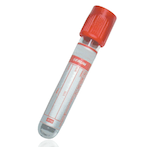Suitable Specimen Types
- Serum
Specimen Transport
Send serum (not less than 1 mL) or cerebro-spinal fluid (2 mL) to the SAS laboratory by first class post. Record on the SAS request form the clinical details and an estimate of the hCG level if known (to facilitate dilution and avoid unnecessary delay).Sample Processing in Laboratory
Usual to BHHSample Preparation
Serum: Collect serum and store at -20C.Cerebro-spinal fluid: Collect without anticoagulant. Store at -20C.
Turnaround Time
1 WeekSample Stability
4 ºCMolar HCG
General Information
This specific hCG assay can be used to:
- Diagnosis of choriocarcinoma and germ cell tumours of the ovary, testis or mediastinum and monitoring response to therapy.
- Monitoring other rare cancers which produce this gonadotrophin ectopically.
- Detection of metastases to the brain from choriocarcinoma or germ cell tumours.
In patients with trophoblastic disease and germ cell tumours, hCG may be secreted as the intact dimer, free beta-subunit or fragments such as beta-core fragment (which is cleared very rapidly from serum and detectable only in urine). In addition, the beta-subunit may be "nicked" i.e. lose specific sections of the peptide chain and the C-terminal may be missing altogether. These changes will affect most commercial assays which were developed principally for measuring hCG in pregnancy and which require two unaltered epitopes to complete the "sandwich".
The antibody used in this radioimmunoassay is directed to a single epitope on the beta-subunit, detects both free beta, intact hCG and beta-core fragment, is not affected by "nicks" and cross-reacts less than 0.25% with luteinising hormone of pituitary origin.
Secretion of hCG declines during successful therapy; renewed secretion provides evidence of recurrence.
The assay can also be used to detect cerebral metastases from intracerebral tumours secreting hCG can be detected from comparison of beta-hCG concentrations in peripheral serum and cerebro-spinal fluid. This requires a CSF sample in addition to the serum sample. This test is not for detecting pregnancy, threatening or missed abortion, ectopic pregnancy, gestosis or intra-uterine death. Please see Beta Human Choronic Gonadotrophin (HCG).
Patient Preparation
Telepat set code = MOLAR
None.
Patients confirmed as having a hydatidiform mole should be registered with the appropriate follow-up Centre (Charing Cross Hospital, London or Royal Hallamshire Hospital, Sheffield).
Patients registered for the hydatidiform mole follow-up service will be instructed to collect blood and/or urine at the required intervals. Containers and instructions will be provided.
Notes
For diagnosis of germ cell tumours or ectopic production of hCG:
Take blood (5 mL). For management of these conditions, take blood (5 mL) before surgery or therapy and within 3 days of initiation of treatment and at regular intervals during follow-up. For Cerebral metastases: Take peripheral blood (5 mL) and cerebro-spinal fluid (2 mL).
Pathology Harmony have recently issued guidance on appropriate tumour marker requesting. For information please click on the following link:
http://www.pathologyharmony.co.uk/harmony-bookmark-v7.pdf
If you would like some copies of the bookmark please contact the Duty Biochemist (bleep 2506).
Reference Range
Provided by Reference Lab
Specifications
- EQA Scheme?: Yes
- EQA Status: NEQAS
